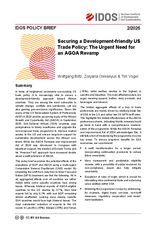Policy Brief
Securing a development-friendly US trade policy: the urgent need for an AGOA revamp
Britz, Wolfgang / Zoryana Olekseyuk / Tim VogelPolicy Brief (2/2025)
Bonn: German Institute of Development and Sustainability (IDOS)
DOI: https://doi.org/10.23661/ipb2.2025
In times of heightened uncertainty surrounding US trade policy, it is increasingly vital to secure a development-friendly approach toward African countries. They are among the most vulnerable to climate change, conflicts and pandemics, yet are also gaining geo-economic significance. Given the expiry of the US Generalized System of Preferences (GSP) in 2020 and the upcoming expiry of the African Growth and Opportunity Act (AGOA) in September 2025, Sub-Saharan African (SSA) countries urge policymakers to timely reauthorise and upgrade the non-reciprocal trade programme to improve market access to the US and ensure long-term support for sustainable development across the African continent. While the AGOA Renewal and Improvement Act of 2024 was introduced to Congress with bipartisan support, the election of Donald Trump and his “America First” approach have increased doubts about a swift extension of AGOA. This policy brief examines the potential effects of the expirations of GSP and AGOA using a multi-region Computable General Equilibrium (CGE) model. By simulating the shift from duty-free to Most Favoured Nation (MFN) treatment, we find the following: All in all, aggregated effects over all countries are rather muted while some specific countries face strong losses. Whereas bilateral exports of AGOA-eligible countries to the US decline by 3.7%, their total exports fall by only 0.1%, with real GDP remaining almost unaffected. Looking more closely, specific SSA countries would face high bilateral losses: The most substantial reduction of exports to the US occurs in Lesotho (-35%), Malawi (-25%) and Kenya (-16%), while welfare decline is the highest in Lesotho and Mauritius. The most affected sectors are sugar, wearing apparel, leather, dairy products, and beverages and tobacco. The limited aggregate effects of a loss in trade preferences are mainly driven by relatively weak ties of SSA to the US and rather low US MFN tariff rates. This highlights the limited effectiveness of the AGOA preference scheme, indicating that its renewal should go hand in hand with a comprehensive modernisation of the programme. While the AGOA Renewal and Improvement Act of 2024 acknowledges this, it still falls short of modernising the programme in some key areas. To ensure long-term benefits for SSA economies, we recommend:
• A swift reauthorisation for a longer period, incorporating continuation provisions to reduce future uncertainty.
• More transparent and predictable eligibility reviews, with a possibility of partial exclusion for non-compliance, would also help mitigate uncertainty.
• Expansion of rules of origin, which is crucial for stimulating intra-continental trade and enhancing value addition within SSA.
• Widening the programme’s scope by addressing, for example, digital trade, services, non-tariff measures, regulatory cooperation and investment facilitation.
PD Dr agr. Wolfgang Britz is a Senior Researcher and lecturer at the Institute for Food and Resource Economics, Bonn University.
Kontakt
Cornelia Hornschild
Koordinatorin Publikationen
E-Mail Cornelia.Hornschild@idos-research.de
Telefon +49 (0)228 94927-135
Fax +49 (0)228 94927-130
Alexandra Fante
Bibliothekarin/Open Access-Koordinatorin
E-Mail Alexandra.Fante@idos-research.de
Telefon +49 (0)228 94927-321
Fax +49 (0)228 94927-130





